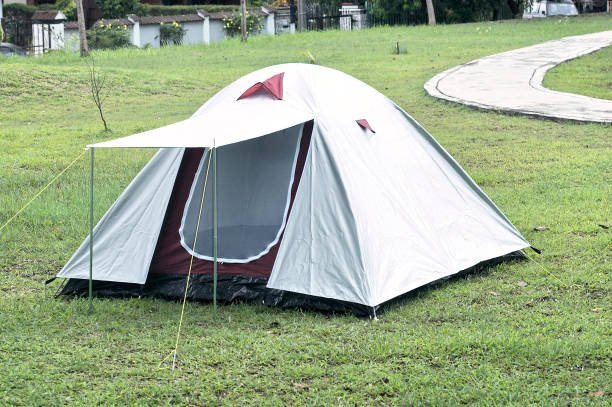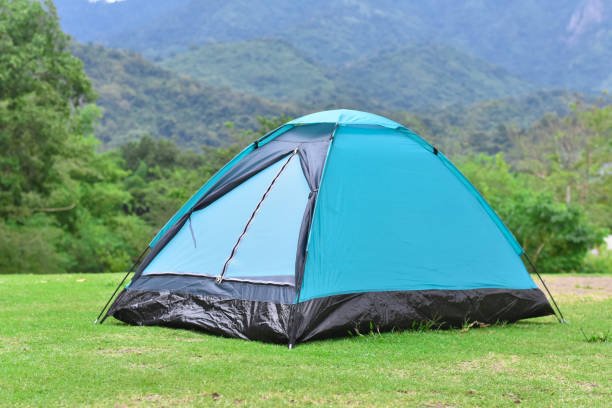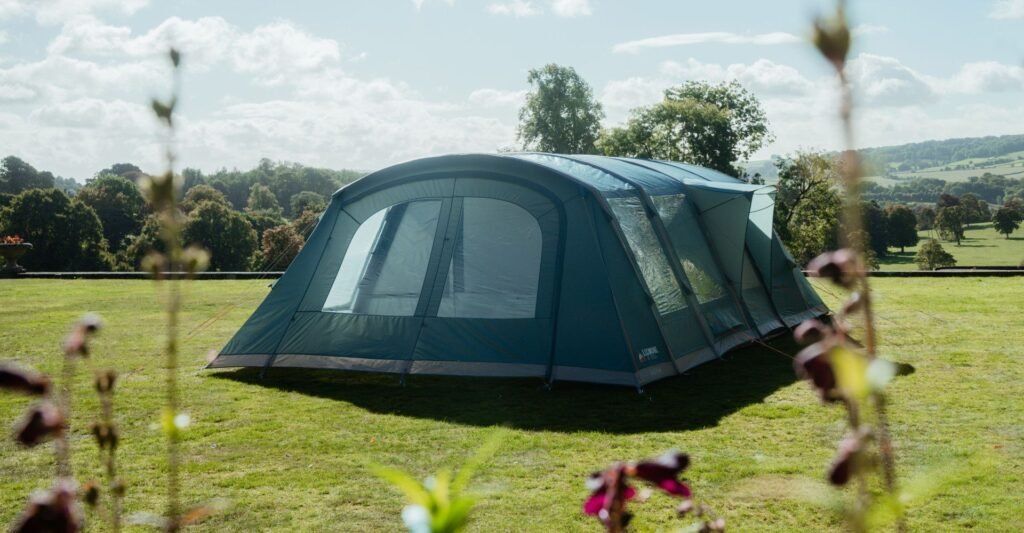Contents
Introduction to Nylon vs Polyester Tents
When it comes to outdoor adventures, the choice between nylon and polyester tents holds significant swing over your camping experience. Despite being synthetic, these materials possess unique traits tailored to various camping preferences and conditions. Understanding the disparities between nylon and polyester tents is crucial for making an educated selection. This guide delves into the nuances of both materials, offering insights to aid in decision-making. From durability and water resistance to weight and packability, each material presents distinct advantages and considerations. By exploring the intricacies of nylon and polyester tents, you’ll be equipped with the knowledge to pick the ideal shelter for your next outdoor venture. Whether you’re a seasoned backpacker prioritizing lightweight gear or a weekend camper emphasizing weather endurance, this guide provides the insights necessary for selecting the tent that aligns perfectly with your needs.

Nylon Tents: Pros and Cons
Nylon tents are a popular choice among outdoor enthusiasts for their lightweight nature and excellent waterproofing capabilities. Here’s a closer look at the pros and cons of nylon tents:
Pros:
- Lightweight: Nylon tents are typically lighter than their polyester counterparts, making them ideal for backpackers and hikers who need to carry their shelter over long distances.
- Waterproof: Nylon fabric is naturally water-resistant and can be further treated with waterproof coatings to enhance its ability to repel moisture. This makes nylon tents a reliable option for camping in wet or rainy conditions, keeping campers dry and comfortable throughout their outdoor adventure.
- Compactness: Due to its lightweight and flexible nature, nylon tents can often be packed down into a compact size, making them easy to store and transport.
- Quick Drying: Nylon tents dry quickly when exposed to sunlight or air, making them convenient for use in damp or humid environments. This rapid drying time helps prevent the growth of mold or mildew and allows campers to pack up their tent and move on to the next destination without delay.
Cons:
- Durability: While nylon tents offer excellent performance in terms of weight and waterproofing, they may not be as durable as polyester tents. Nylon fabric can be prone to tears and punctures, especially when subjected to rough handling or abrasive surfaces.
- UV Degradation: Nylon fabric can degrade over time when exposed to prolonged sunlight, leading to a reduction in its strength and durability. This can cause the tent material to become brittle and prone to tearing, particularly in areas with intense sun exposure. Campers should consider using a tent footprint or rainfly to provide additional protection against UV rays and extend the lifespan of their nylon tent.
- Condensation: Nylon tents may be more prone to condensation buildup compared to polyester tents, especially in humid or rainy conditions. The moisture inside the tent can lead to discomfort for campers and may require proper ventilation or the use of additional gear such as a tent fan or dehumidifier to mitigate.
- Cost: While nylon tents are generally more affordable than high-end polyester tents, they may still represent a significant investment for budget-conscious campers.
In summary, nylon tents offer several advantages such as lightweight design, excellent waterproofing, and compactness, making them a popular choice for backpackers and hikers. However, campers should be aware of the potential drawbacks, including durability issues, UV degradation, condensation buildup, and cost considerations, to make an informed decision about whether a nylon tent is the right option for their outdoor adventures.

Polyester Tents: Pros and Cons
Polyester tents are a popular choice for campers seeking durability and longevity in their outdoor shelter. Let’s explore the advantages and disadvantages of polyester tents:
Pros:
- Durability: Polyester fabric is known for its strength and resistance to wear and tear, making polyester tents a durable option for long-term use. They can withstand rough handling and are less prone to tears or punctures compared to nylon tents.
- UV Resistance: Polyester tents are highly resistant to UV rays, making them suitable for camping in sunny environments. The fabric’s ability to withstand prolonged exposure to sunlight helps maintain the tent’s integrity over time, reducing the risk of degradation and ensuring long-lasting performance.
- Color Retention: Polyester tents retain their color well, even after prolonged exposure to sunlight and outdoor elements. This helps maintain the tent’s aesthetic appeal and prevents fading, ensuring that it looks fresh and vibrant throughout its lifespan.
- Low Maintenance: Polyester tents require minimal maintenance and care compared to other materials. They are easy to clean and can often be machine-washed without causing damage to the fabric. This makes polyester tents a convenient choice for busy campers who prefer hassle-free gear.
Cons:
- Weight: Polyester tents tend to be heavier than their nylon counterparts, making them less ideal for backpacking or hiking trips where weight is a primary concern. The heavier weight of polyester tents can add to the overall load carried by campers, potentially limiting mobility and comfort during long treks.
- Breathability: Polyester fabric is less breathable than nylon, which can lead to condensation buildup inside the tent, particularly in humid or warm conditions. Poor ventilation may result in discomfort for campers and an increased risk of moisture-related issues such as mold or mildew.
- Absorption: While polyester tents are inherently water-resistant, they may absorb moisture over time if not properly treated with waterproof coatings. This can compromise the tent’s ability to repel water and increase the likelihood of leaks during rainy weather, requiring campers to take extra precautions to maintain dryness inside the tent.
- Cost: Polyester tents are often more expensive than nylon tents due to their superior durability and UV resistance. While the initial investment may be higher, the long-term benefits of a polyester tent may justify the higher cost for campers seeking reliable and durable outdoor shelter.
In summary, polyester tents offer several advantages such as durability, UV resistance, color retention, and low maintenance requirements. However, campers should consider the potential drawbacks including weight, breathability, moisture absorption, and cost when deciding whether a polyester tent is the right choice for their outdoor adventures.

Comparison of Nylon vs Polyester Tents
When choosing between nylon and polyester tents for your outdoor adventures, it’s essential to consider various factors to make an informed decision. Here’s a comparison of the two materials to help you determine which type of tent best suits your needs:
1. Durability:
Nylon Tents:
- While nylon tents are lightweight and offer excellent waterproofing, they may not be as durable as polyester tents. Nylon fabric is prone to tears and punctures, especially when exposed to rough handling or abrasive surfaces.
Polyester Tents:
- Polyester tents are known for their durability and resistance to wear and tear. The polyester fabric is stronger and more resilient than nylon, making polyester tents a better option for long-term use in rugged outdoor environments.
2. Weight:
Nylon Tents:
- Nylon tents are lightweight, making them ideal for backpackers and hikers who need to minimize the weight of their gear. The lightweight design of nylon tents allows for easier transportation and reduces the overall burden on the camper’s back.
Polyester Tents:
- Polyester tents tend to be heavier than nylon tents, which can be a drawback for backpackers or individuals looking to travel light. The additional weight of polyester tents may limit mobility and comfort during extended hiking or trekking trips.
3. Waterproofing:
Nylon Tents:
- Nylon fabric is naturally water-resistant and can be further treated with waterproof coatings to enhance its ability to repel moisture. Nylon tents offer reliable protection against rain and wet weather conditions, keeping campers dry and comfortable inside the tent.
Polyester Tents:
- Polyester tents also provide excellent waterproofing capabilities, ensuring that campers stay dry even during heavy rainfall. The polyester fabric’s resistance to moisture makes it a suitable choice for camping in wet or humid environments.
4. UV Resistance:
Nylon Tents:
- Nylon fabric may degrade over time when exposed to prolonged sunlight, leading to a reduction in its strength and durability. Campers need to take precautions to protect nylon tents from UV rays, such as using a rainfly or tent footprint to provide additional shade and protection.
Polyester Tents:
- Polyester tents are highly resistant to UV rays, making them an excellent choice for camping in sunny environments. The polyester fabric maintains its integrity and strength even after prolonged exposure to sunlight, ensuring that the tent remains durable and reliable over time.
5. Breathability:
Nylon Tents:
- Nylon tents tend to be more breathable than polyester tents, allowing for better airflow and ventilation inside the tent. This can help reduce condensation buildup and improve overall comfort for campers, particularly in warm or humid conditions.
Polyester Tents:
- Polyester tents may be less breathable than nylon tents, which can lead to condensation buildup inside the tent. Poor ventilation may result in discomfort for campers and an increased risk of moisture-related issues such as mold or mildew.
Here’s a comparison of nylon and polyester tents:
| Aspect | Nylon Tents | Polyester Tents |
|---|---|---|
| Weight | Lightweight and easy to carry for backpacking | Heavier compared to nylon, less ideal for backpacking |
| Durability | Prone to tears and punctures | Resistant to wear and tear |
| Waterproofing | Offers reliable protection against rain | Highly resistant to UV rays and water |
| UV Resistance | May degrade over time in sunlight | Withstands prolonged sun exposure |
| Breathability | Provides decent breathability, less condensation | Less ventilated, leading to more condensation |
| Color Retention | Color may fade over time | Maintains color vibrancy |
| Maintenance | Requires some care to maintain | Requires minimal care |
| Cost | Generally more affordable | Initial investment can be higher |
Conclusion:
Both nylon and polyester tents have their advantages and drawbacks, and the choice ultimately depends on your specific preferences and requirements. If you prioritize lightweight design and quick drying, a nylon tent may be the best option for you. However, if durability and UV resistance are more important, a polyester tent might be the better choice. Consider your camping needs, environmental conditions, and budget constraints to select the perfect tent for your outdoor adventures.



Pingback: Polyester vs Cotton Fiber: Which is better for Shelter in winter